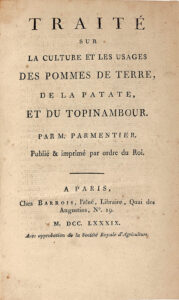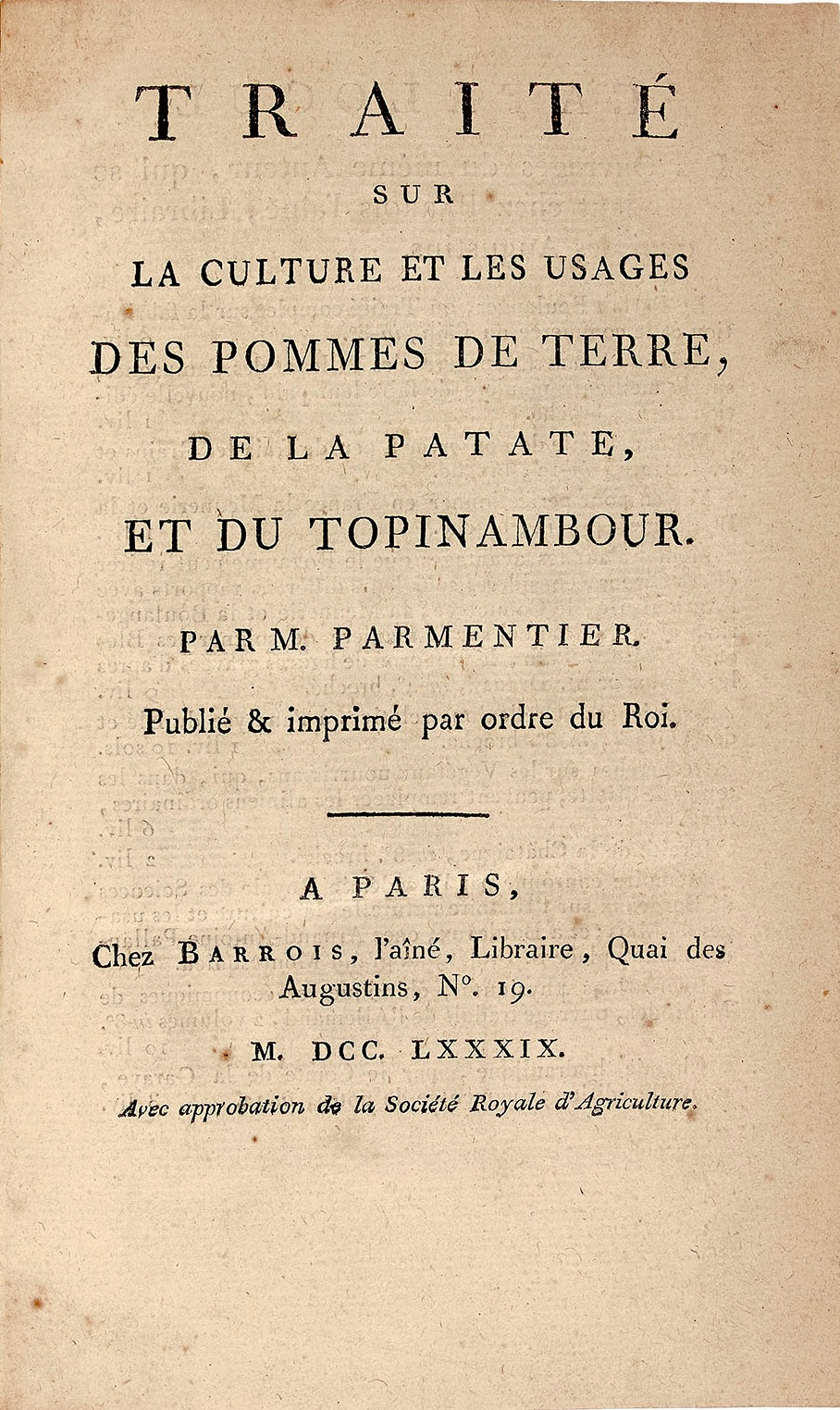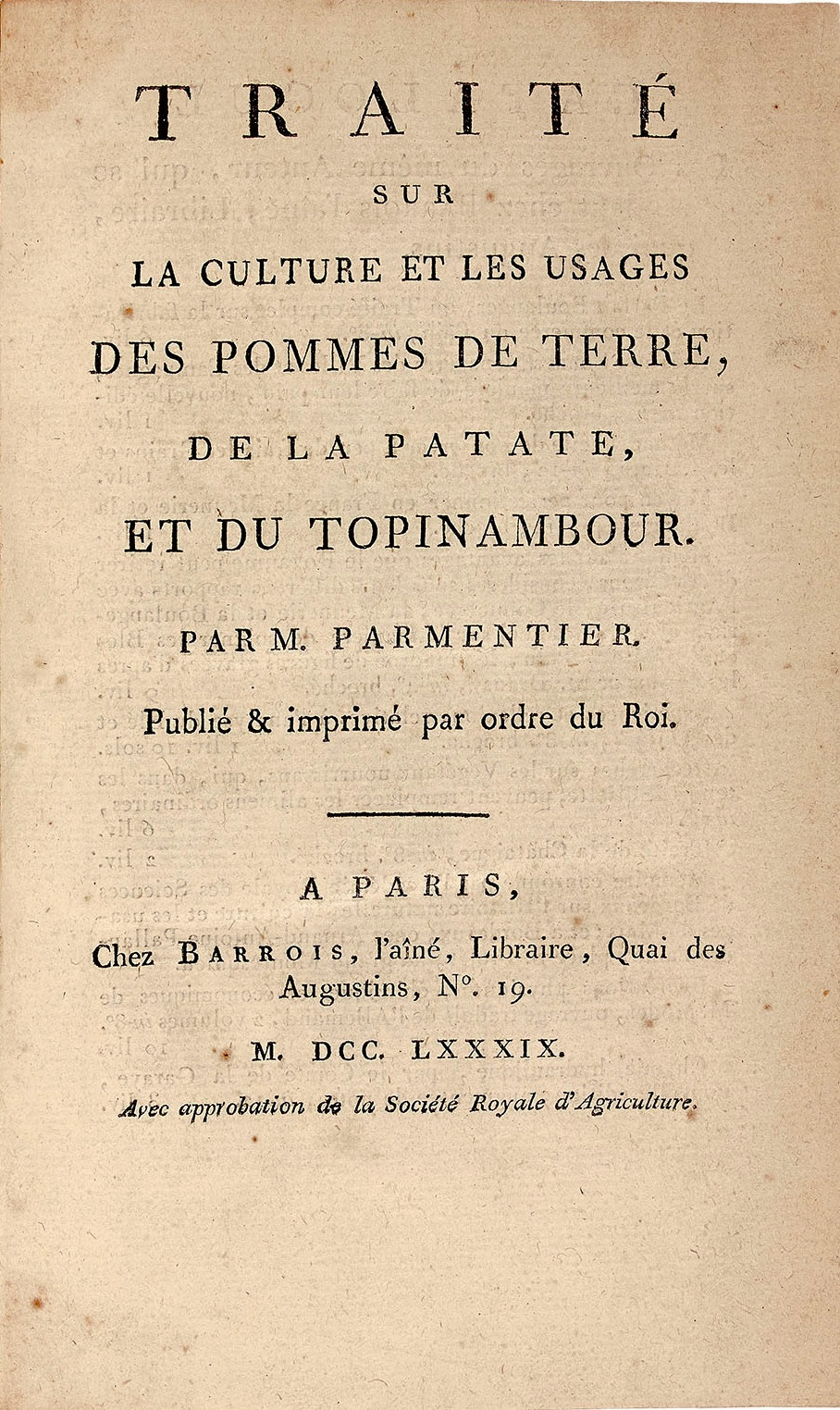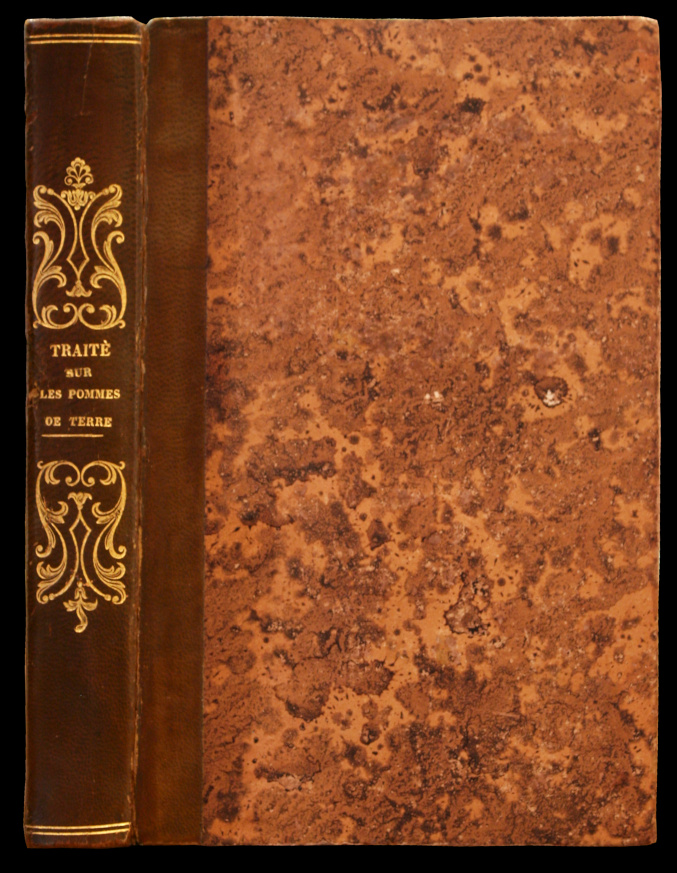Paris, Barrois l’ainé, 1789.
Avec approbation de la Société Royale d’Agriculture.
8vo [195 x 125 mm] of viii prelim. ll., 389 pp., (2) ll. including the errata inserted between the pp. 386 and 388. Excerpt from the Journal de Paris from January 7, 1789 concerning Parmentier inserted between pp. 204 and 205, small tear without loss p. 273. Brown half-calf, gilt rocaille ornamentation on the flat spine, green sprinkled edges. Binding circa 1830.
Sought-after first edition of Parmentier’s famous work dedicated to the cultivation and consumption of potato, up to here abandoned to animals.
Vicaire, Bibliographie gastronomique, 657; not in Oberlé, Les Fastes de Bacchus et Comus.
Poorly raised as well as his two brothers by an early widowed mother, Parmentier had to interrupt his studies at the age of eighteen to be apprenticed to an apothecary of Mont Didier then in 1756 to an apothecary in Paris.
At the age of 20 he obtained a position of pharmacist-assistant for the Hanover army operating in the Seven Years War. Held prisoner by the troops of Frederick II, it was in captivity that he ate potatoes for the first time, staple food of the Prussians, as well as half of the peoples of Europe.
Therefore by personal experience, he made sure that this food was good and healthy, that it was neither bland nor insipid, that it gave neither the leprosy nor the fevers, prejudices that shared the majority of the French, with the exception of peasants from the neighboring provinces of Switzerland, Germany or Flanders who were using them since the 17th century. But in the other provinces and in Paris, the people didn’t want it, estimating them just good enough to draw powder to powder the wigs.
Returned to France at the signing of the peace in 1763, Parmentier obtained in 1766 the position of apothecary-assistant at the Invalids; six years later, he was appointed chief pharmacist of this institution.
Dearth and famine struck France once again in 1770. These scourges prompted the Academy of Besancon the following year to put to the competition the question: “Indicate the plants that could supply in times of dearth to those whom are commonly used to nourish men and what should be its preparation?” Of the seven memoirs received by the Academy, it was Parmentier’s who won the vote. From now on, the “humanitarian pharmacist”, as he has been nicknamed, will be at the forefront of potato advocates. The latter has certainly many defenders, but he is the best placed with the King’s advisers and Louis XIV himself to advance its cultivation and its consumption.
Parmentier is above all a man with practical experience. He is a pragmatist who, before Claude Bernard defines them, applies the principles of scientific research, basing his opinions on experience only.
He is also a forerunner of publicity. Thus he urges the King and the Queen to put potato flowers in their buttonhole to prove the Majesties’ interest in this food. He obtains from the sovereign a sterile ground, the plain of Grenelle known as Sablons, to demonstrate the facilities offered by this cultivation. Even better, he willingly lets the people steal the fruits of the harvest. He organizes around Franklin, Lavoisier and other scientists a meal entirely based on potatoes. All the preparations, even the liqueurs, consisted of the potato disguised under twenty different forms, and where he had gathered many guests: their appetite was not in default, and the praises they gave to the amphitryon turned to the advantage of the wonderful root.
Thanks to Parmentier’s efforts and perseverance, the potato finally took the rank it was belonging to among our agricultural resources.
En français dans le texte. Dix siècles de lumières par le livre, pp. 182-183.
« Parmentier’s earliest investigation, dating from about 1771 [Examen chimique des pommes de terre, 1773], concerned the chemical and nutritive constituents of the potato. This research was soon broadened to include a large number of indigenous plants which he recommended as food in times of scarcity and famine, ascribing their nutritive value to their starch contents. Of all these plants it was the potato that most interested Parmentier, and it is unfortunate that his long and successful campaign to popularize the cultivation and use of the potato in France as a cheap and abundant source of food has tended to obscure his other accomplishments in food chemistry and nutrition” (DSB).
“In 1789 the Bastille fell. At the same time, people became aware of the usefulness of the potato. Parmentier’s treatise on growing and cooking potatoes was in all good Republican bookshops. It is likely that those providential tubers might have had to wait even longer to get into the recipe books but for war and famine, themselves a recipe for disaster. Parmentier, an army pharmacist, had long been doing his best to explain to the nation that there was nothing like the potato for lining the stomach. Since returning from captivity in 1763, after the Seven Year’s War, he had devoted his energies to promoting it. Antoine-Auguste had eaten the strange tuber in his Westphalian prisoner-of war-camp. The Germans of Westphalia called it Kartoffel, and regarded it as good only for pigs and therefore, a fortiori, for French prisoners” (Toussaint-Samat, A History of Food, p. 717).
Fine and precious copy from the Count Frederic de Pourtales’ library, with his ex-libris with arms.
An excerpt from the Journal de Paris dated January 7, 1789 was bound inside the copy, publishing a letter from Parmentier worrying about the winter cold that would have harmed the potatoes harvest and giving a recipe for bread made from flour and potato.




